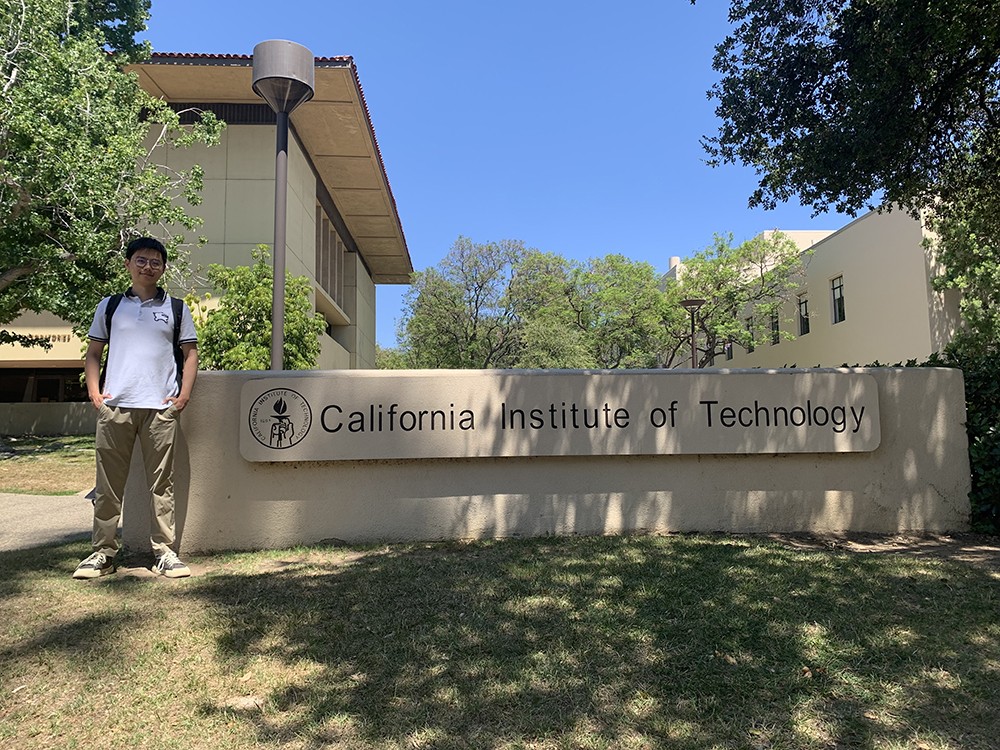Engineering the Summer is an annual series following molecular engineering students as they embark on summer internships and industry experiences.
In the past decade, quantum computing has emerged from the annals of theoretical physics to become a bright technological reality, one poised to transform large swathes of industry. Built on the uncanny laws of quantum mechanics, the field offers potential solutions to some of humanity’s greatest ponderances and problems—climate change, drug discovery, information security, even package delivery.
But delivering on that future requires a new generation of quantum engineers trained in the highly specialized field and able adapt to its rapid evolution—people like Senrui Chen.
Chen is now a second-year PhD student at the Pritzker School of Molecular Engineering, where he’s working to solve practical problems for quantum computers and quantum networks from a theoretical perspective. This summer he’s bringing that experience to Amazon Web Service’s Center for Quantum Computing, applying his knowledge to their efforts in quantum control.
What first sparked your interest in quantum science?
When I started my undergraduate at Tsinghua as an electronic engineering major, I had no idea what the word “quantum” meant. At the time, I planned to become an electronics engineer or work in AI research like most of my fellow students. But, during my first year, I attended a quantum colloquium and, even though I couldn’t fully grasp everything that was being discussed, it was clear to me that quantum computers would become a major force in the industry. Since then, I’ve learned quite a bit more, and I’m still fascinated by how quantum computing brings a completely new perspective to computer science.
Is there anyone in your life who’s inspired you to pursue quantum science?
Many people, but perhaps the one who inspired me most is Professor Yu-xi Liu, who gave me an A+ for in his class “Introduction to Quantum Information Science,” in my second year. It might sound like just a grade, but it really gave me the confidence to believe I could do well in this field.
This summer you’re interning at Amazon. How’s that experience been?
Yes! It’s been great. I’m working as a research intern with a team that’s diving into the practical challenges in building a quantum computer. In some ways the research environment at Amazon feels similar to PME. There’s a feeling that people are working collectively towards a specific scientific goal, though it’s especially targeted here since the ultimate goal is to provide a marketable service or product through quantum computing.
More specifically, I have been diving into the physics of superconducting qubits and quantum control in real experiments. My normal work is more focused on the theoretical and mathematical side of things. The whole experience has been very exciting and rewarding.
How does that relate to your work at PME? Can you talk a bit about your research here?
I work on developing robust quantum applications. This includes designing novel benchmarking and calibration protocols to characterize noisy quantum devices, as well as exploring tasks for near-term quantum computers to demonstrate practical advantages. My research is mainly theoretical, but most of the problems I am interested in are also rooted in practical engineering or physical needs. During my time at PME, my colleagues and I have made progress on quantum advantages in learning and quantum noise learnability.
How do you see the field growing in the coming years?
We are at a very exciting stage in quantum information science. As pointed out by John Preskill, we now have access to noisy-intermediate scale quantum devices, which have potential real-world applications in various fields such as cryptography, chemistry, and sensing. However, there are still great challenges. It is difficult to predict how exactly quantum science will change the world in the near future, but the field is growing so rapidly that I expect will have an answer to that soon.
What role do you hope to play in that future?
I hope to accelerate the development of quantum computing into practical use. My goal is to develop techniques that overcome real challenges in the roadmap.
How has the environment at PME influenced your work?
PME is made up of people from highly diverse academic backgrounds. There are both experimentalists and theorists who work closely together. As a theory student, that’s valuable. It means I can get quick feedback about realistic considerations from my experimental partners. That’s critical for a field like quantum science because it’s fundamentally built on interdisciplinary effort.
PME is one of the nation’s leading institutions in quantum engineering research and education. Its PhD in Quantum Science and Engineering was one of the first degrees in the country dedicated specifically to this rapidly emerging field.

